Posts Tagged ‘early onset alzheimer’s’
Using Business Acumen in Alzheimer’s Advocacy: Michael Ellenbogen
Most people would have been stressed out by the constantly changing technology, the large territory, and the escalating demands of working as a high-level data center manager. Michael Ellenbogen thrived on the challenges.
“I didn’t feel the stress; I loved constantly learning and I became the go-to-problem solving person in my organization,” he says.
By his mid-thirties, Michael had a wonderful wife and daughter, a nice house, a boat, and a rewarding and stimulating career.
Then, at age 39, he realized that something was wrong. He’d forget meetings, dashing in minutes late, claiming a crisis. He’d look at an employee and blank on her name. When people threw around familiar industry acronyms, Michael couldn’t remember what the letters stood for.
“Just part of everyday stress,” his colleagues assured him, when he mentioned these lapses.
But the aberrations were disturbing and Michael went to his doctor. “Stressed,” his doctor said.
Through the next years, Michael fervently sought answers but received only platitudes.
In 2003, when he was 45-years-old, he was terminated. He applied for another job, a high-level manager’s position. But the interviewer asked him a math question and Michael didn’t know the answer.
“I’d done budgets of millions but I couldn’t come up with the number,” Michael says. “Luckily, an old boss gave me a chance at a consulting job.”
Michael studiously took notes, trying to learn the job. He worked diligently, putting in grueling hours, but he wasn’t meeting his quota. And it was exhausting, trying to hide his problems from those working with him.
Again, he sought medical information. Finally after an MRI, a PET scan, and batteries of tests, Michael, then age 49, was diagnosed with Mild Cognitive Impairment/Alzheimer’s Disease.
“That moment changed my life,” Michael said.
Having a diagnosis brought some relief. But when he learned more about Alzheimer’s, he was initially devastated, understanding there was no cure. His natural resilience soon surfaced and he embraced the philosophy, “Don’t worry about something you can’t change.”
So often, the disease isolates people, but Michael is determined to stay active, engaged, and make a difference.
“People living with dementia need a purpose,” he says.
Michael’s purpose is strong and clear: he works long days, educating, connecting, and advocating. He serves on five advisory boards and regularly speaks out on radio and television. He’s testified in front of Congress and communicated with both Congress and the Senate. He’s working with AARP and helping a hospital become dementia-friendly.
“Many in our society think Alzheimer’s is a part of normal aging. But it’s a disease, not the norm and we need to treat dementia as fairly as we treat other diseases,” Michael says. “NIH contributes 18.7% to cancer, 9.9% to HIV and only 1.5% to Alzheimer’s. This is an injustice.”
What the business world lost, those living with dementia have gained. Michael is a hard-hitting, vocal, and determined, strategist, dedicated to improving the lives of those living with dementia. ###
How can you help Michael and others living with dementia?
Michael advises: “Mail a letter to senators and congressman, sharing the story of someone who has dementia, so they can understand the devastation factor behind this disease.”
Visit Michael’s website: www.MichaelEllenbogenMovement.com
Read his book: From the Corner Office to Alzheimer’s
Deborah Shouse is the author of Love in the Land of Dementia: Finding Hope in the Caregiver’s Journey.
Three Reasons to Give Life Meaning by Giving Back
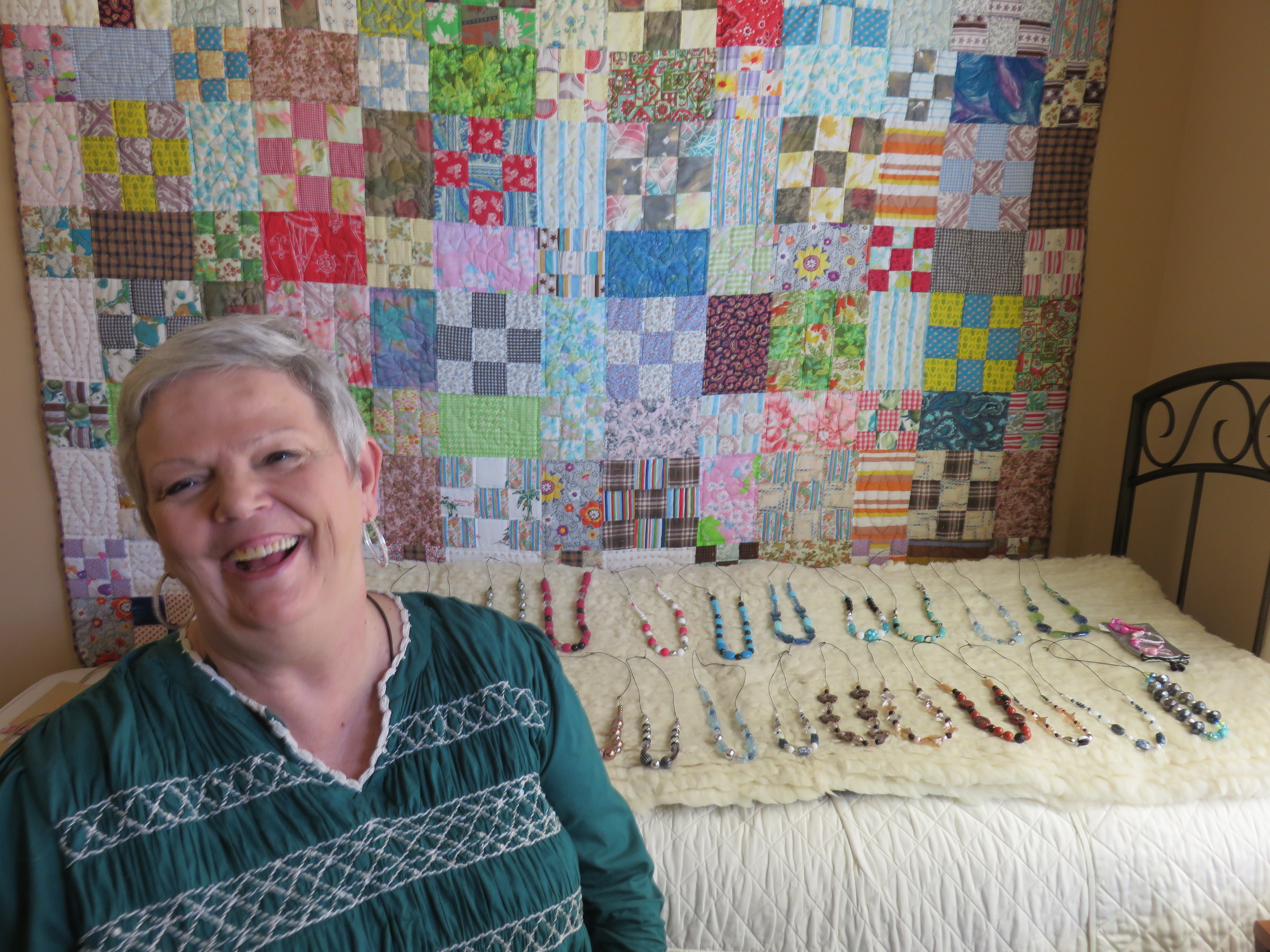 Even when she was traveling the globe, designing and creating family-oriented projects, such as children’s museums, farms and gardens, Vicki Stoecklin made time to volunteer. She’d work on projects in Thailand, Saudi Arabia, and China, but whenever she was home in Kansas City, Missouri, Vicki shared her time and talents with non-profit organizations including the Girl Scouts, the local food bank, a boy’s home and more.
Even when she was traveling the globe, designing and creating family-oriented projects, such as children’s museums, farms and gardens, Vicki Stoecklin made time to volunteer. She’d work on projects in Thailand, Saudi Arabia, and China, but whenever she was home in Kansas City, Missouri, Vicki shared her time and talents with non-profit organizations including the Girl Scouts, the local food bank, a boy’s home and more.
When Vicki was diagnosed with early-onset Alzheimer’s, her life radically changed; she had to give up her dynamic travel schedule and her demanding and rewarding career. But she never considered giving up her volunteer activities; in fact, she consciously began seeking more opportunities to give back to her community.
Many of her normal activities were no longer viable: she couldn’t drive, read or cook. Her normally stellar math skills were impaired. Suddenly, instead of having to make every minute count, she had nothing but time. Within these limitations, she had to reframe her life and find new activities that stimulated and engaged her.
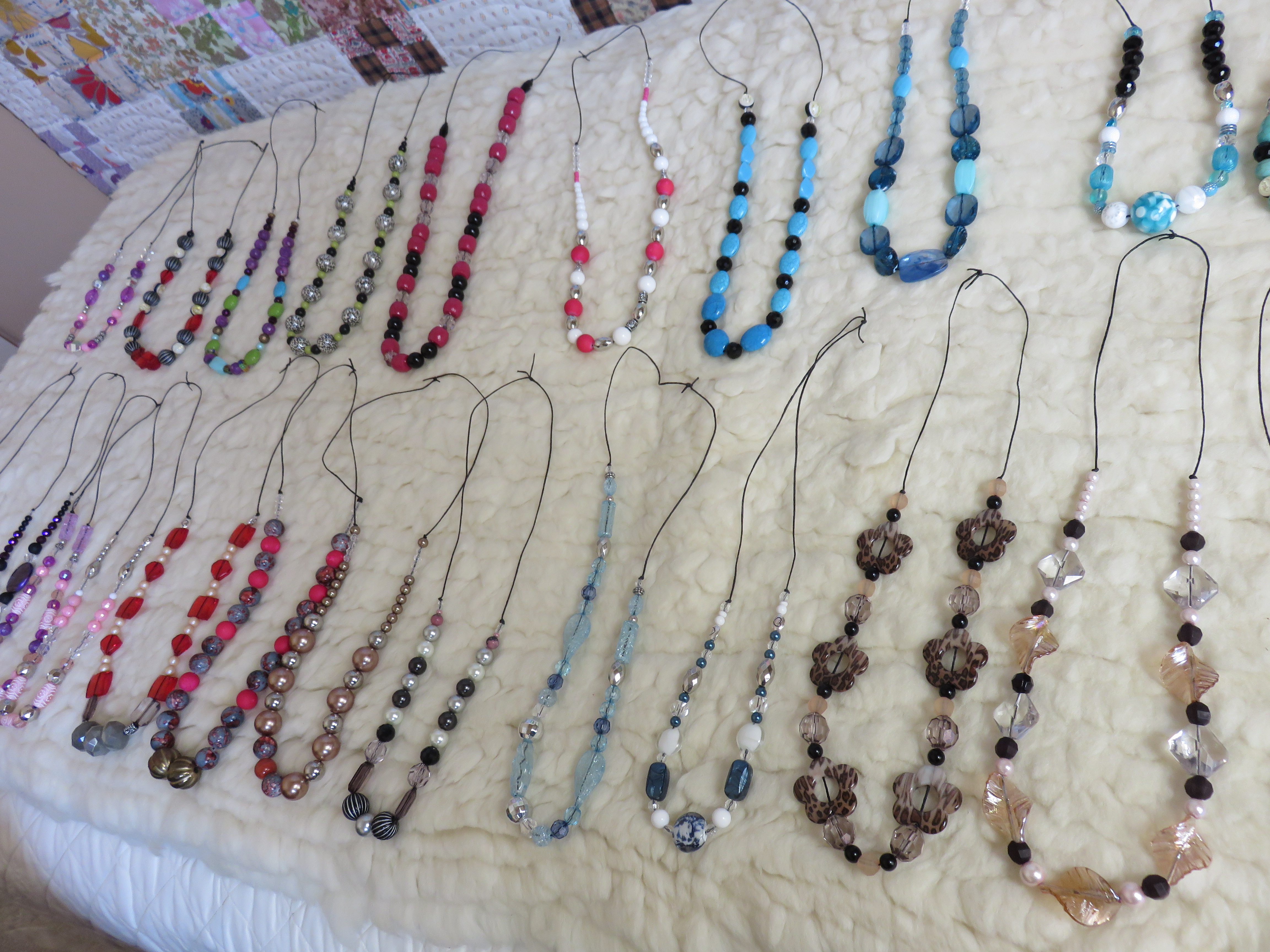 As Vicki pondered what to do with her life, she thought of Sheffield Place, a local shelter for single moms and their children. These women were struggling and rarely had enough money for any personal extras. Vicki decided to make necklaces for the mothers in the shelter. She enjoyed buying the beads and learning to string them in an artistically pleasing way, creatively combining colors, sizes and patterns. She also crafted a special gift bag for each necklace, decorating each with brightly colored stickers. When Vicki delivered her creations, the women and the staff were so grateful and so pleased. Their gratitude gave Vicki a sense of completion and connection.
As Vicki pondered what to do with her life, she thought of Sheffield Place, a local shelter for single moms and their children. These women were struggling and rarely had enough money for any personal extras. Vicki decided to make necklaces for the mothers in the shelter. She enjoyed buying the beads and learning to string them in an artistically pleasing way, creatively combining colors, sizes and patterns. She also crafted a special gift bag for each necklace, decorating each with brightly colored stickers. When Vicki delivered her creations, the women and the staff were so grateful and so pleased. Their gratitude gave Vicki a sense of completion and connection.
One day, riding home from an appointment, Vicki noticed a dog shelter.
The thought floated into her mind: Wouldn’t it be fun to make blankets for the dogs?”
So, she made small, cozy blankets for the animals in the shelter. She enjoyed picking out colorful flannel, sizing it, then cutting fringe around the edges, and tying two pieces of fringe into knots.
“Making these blankets was relaxing and therapeutic,” Vicki says. “The cutting and tying helped me maintain my fine motor skills and the easy nature of the project allowed other people to get involved.”
When friends saw the fabric lying across Vicki’s lap, they asked, “What are you making?” Vicki explained and soon her friends were sitting beside her, tying away.
“With my dementia, I have a hard time finishing a project, “Vicki says. “These art projects allow me to complete a craft and give me a sense of accomplishment. Plus, learning new skills stimulates my brain.”
For Vicki, being a productive person and making a contribution to society, rather than just sitting around, has given her a much-needed sense of creativity and purpose. She encourages others with a similar diagnosis to seek what brings them joy and open up to new ideas and activities.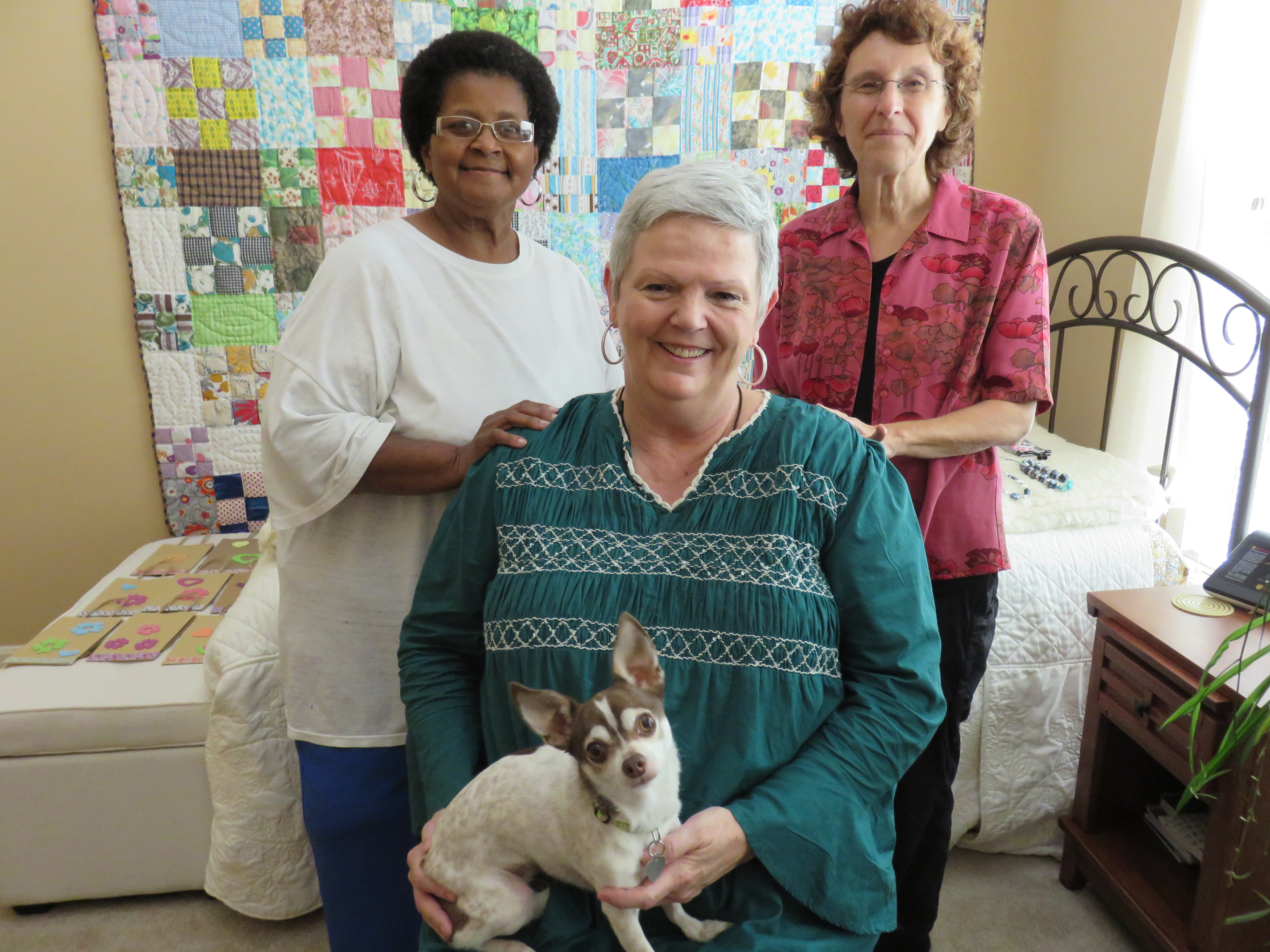
***
Finding ways to give back offers people a sense of purpose and a connection with others. Seek projects that are:
Tangible, finite and easy to finish
Fun to do alone or with others
Aligned with an organization the care partner can relate to
Connected to non-profits that can communicate gratitude
Deborah Shouse is the author of Love in the Land of Dementia: Finding Hope in the Caregiver’s Journey.
An Insider’s Look at True Love: Charlie and Elizabeth’s Story
Every week, I interview couples and write their love story for the Kansas City Star. Every story is different and talking to people who are in love is always inspiring; often couples have to overcome enormous obstacles to bring their relationship into reality. A few days ago, I talked with two friends whose love and cosmic connection shone out from their faces and rang out with their words. I wanted to share this small part of their story with you.
**
The coffee date was going better than Charlie, age 60, could have ever imagined. Just a month earlier, his best friend had burst into Charlie’s dark apartment and roused Charlie from his lethargy, saying, “You need to open up these windows and let some light in. You should start dating.”
“Who would go out with a guy who has Early Onset Alzheimer’s?” Charlie asked his friend.
“Maybe you should find out,” his friend replied.
So Charlie Miller pried himself out of his depression and joined eHarmony. And this coffee date with Elizabeth Hack was the result.
Elizabeth, age 55, was brilliant, interesting, energetic, curious, and shared many of Charlie’s interests. When she asked Charlie what he liked to do, he mentioned listening to music, attending theater, visiting with friends and volunteering for the Alzheimer’s Association.
Elizabeth knew nothing about Alzheimer’s. She asked, “Does someone close to you have the disease?”
“Yes,” Charlie answered. He wanted to say more but the words stuck in his throat. He had never envisioned this casual meeting could possibly turn into a romance. Yet he was already comfortable with Elizabeth and felt their relationship was meant to be.
Over the weeks, they continued seeing each other, meeting at concerts, going to plays, and exploring new restaurants. As their friendship deepened. Charlie knew he had to share his diagnosis with Elizabeth and he worried she wouldn’t be able to accept it.
But before he had a chance to broach the subject, Elizabeth, wanting to learn more about Alzheimer’s and about Charlie’s interests, visited the local Alzheimer’s Association website and noticed a picture of Charlie, as a volunteer and a person who has Alzheimer’s. She was shocked, dismayed, and confused. But she was also in love with Charlie; his diagnosis did not diminish her deep feelings for him.
 Charlie suggested she meet with his social worker at the Association to learn more about the disease. Elizabeth did that and though the information was daunting, her connection with Charlie was strong and true; she, too, felt they were destined to be together.
Charlie suggested she meet with his social worker at the Association to learn more about the disease. Elizabeth did that and though the information was daunting, her connection with Charlie was strong and true; she, too, felt they were destined to be together.
They began traveling and made plans to move in together. In a vineyard restaurant in Napa Valley, Charlie proposed and Elizabeth said Yes. Today, they are living happily, grateful they have found each other
“None of us know what will happen next,” Elizabeth says. “Just the other night, we were at a dinner party. One friend was just released from the hospital after heart surgery, and another friend was facing a hip replacement. I felt concerned for my friends and I felt so lucky that Charlie and I were happy and together. We are dedicated to living with joy and curiosity in the present moment.” 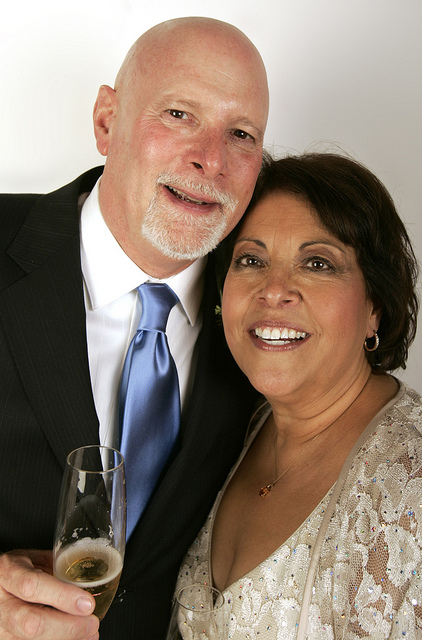
*****
Q 4 U: What is a reason for gratitude in your life?
Six Spiritual Practices For Living with a Diagnosis of Dementia
Normally, you can put my friend Vicki Stoecklin in any city and she will easily get her bearings. From Paris to Dubai to Marrakesh, Vicki is used to working in and making her way around foreign countries.
So, at age 58, when she started getting lost in her own city, she knew something was seriously wrong.
Vicki had been plagued with a series of chronic physical ailments and she figured she’d deal with whatever this new issue was.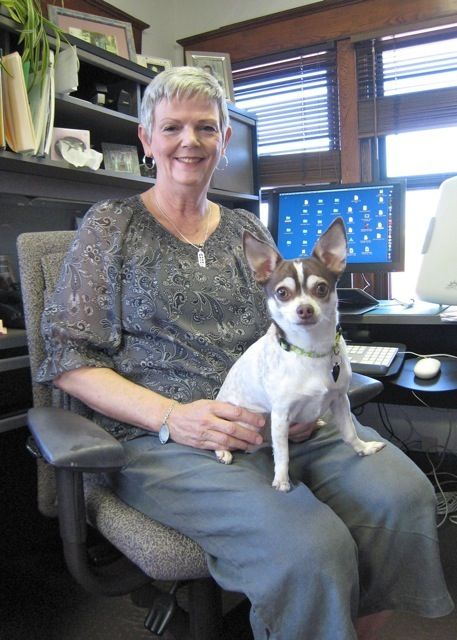
But she was caught off when the neurologist said bluntly, “You have dementia.”
“What am I supposed to do?” Vicki said.
“Live your life,” he said.
Learning to Live with Dementia
Initially, ”living life” was a huge challenge. She had trouble remembering where she’d put things; her feelings were disoriented. She could no longer drive and or do simple math. Her vision played tricks on her: she saw black holes where there were none. And she felt isolated from her community and friends.
But Vicki had a wealth of inner strength and resources. When she told me about her spiritual practices, I was inspired and moved. Here are a few of the ideas she uses to center and care for herself.
Learning Self-Compassion
“I learned to have compassion for myself,” she says. “If I’m having a hard time concentrating on a book, I stop and do something comforting, instead of pushing myself.”
Using Family Treasures to Encourage Contemplation 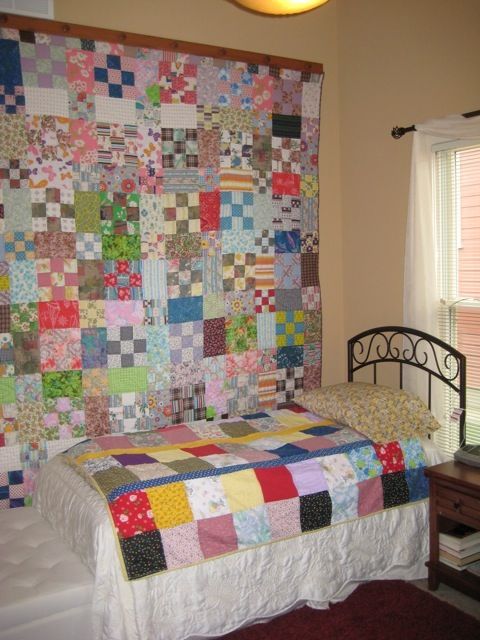
Vicki enjoys contemplating her grandmother’s hand made quilt, which hangs on the wall of Vicki’s meditation room. “She probably had Alzheimer’s when she stitched those squares together,” Vicki says.
Inviting out the Inner Artist
Vicki uses crayons, watercolors, and colored pencils to explore her own artistic process.
“My depth and visual perception is off, so my work is abstract,” she says. “I also find it meditative to color labyrinths and mazes.”
Opening the Heart to Spiritual Texts
Vicki has a number of trusted books she calls upon.
One favorite is Peace in the Storm: Daily Meditations and Prayers for Those Affected with Chronic Illness.
“This book has been a great support to me,” Vicki says. “It’s about finding your relationship with God during the challenges of ongoing illness.” Another book that spoke to Vicki was Proof Of Heaven by Eben Alexander, a neurosurgeon who writes about his near-death experience. She also frequently reads Psalms.
Praying With and For Others
Vicki has a small box that she puts little prayers in for her grandson and her daughter. She has become a chaplain at her church and often prays for others. She also finds comfort in using the 24-hour prayer service at Silent Unity
Documenting Her Life Story
She has created two memory books — one for her work and one for her life. “These books are also reminders of the many happy memories over my lifetime,” she says.
*****
Q 4 U
What are some ways you incorporate spirituality into your life?
If you’d like to contact Vicki, you may email her at Vicki vickiwhllg@aol.com
